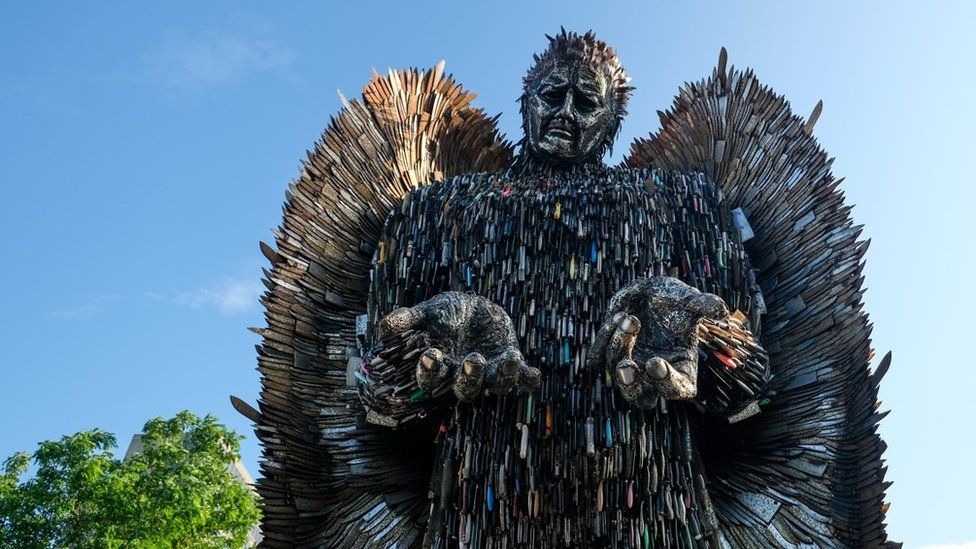A Year Since The Arrival of The Knife Angel - Has Anything Changed?
It has been a year since the 27ft Knife Angel was installed at Friars Walk in Newport, Wales. Commissioned by the British Ironwork Centre in Oswestry, the Knife Angel is a sculpture made from more than 100,000 knives representing the ‘nation’s intolerance and rejection of violence’.

A sight to behold, the Knife Angel’s visit was accompanied by anti-violence workshops delivered to schools across Gwent and saw the participation of 100s of children.
The year 2021-2022 recorded the highest number of people killed with a knife in England and Wales in the last 76 years. The report by the Office for National Statistics (ONS) highlights the use of knives or sharp objects in 75 per cent of teenage murders when compared with 40 per cent in adults.
Spotlight on the youth
The Youth Endowment Fund surveyed over 7,574 teenage children aged 13-17 in England and Wales about their experience with violence and vulnerability. The survey found that 16 per cent of children were victims of violence, 44 per cent had witnessed violence and nearly half, 47 per cent were either a victim or witness to violence within the last 12 months.
It was found that children who were more vulnerable to crime and exploitation experienced higher proximity to violence. Similarly, children who had used drugs and who had regularly missed school were more than twice as likely to be victims or perpetrators of violence.
Teenage children living in households with dire financial conditions including those using food banks were more likely to be victims of violence. Rising poverty during the cost of living crisis could result in increased stabbings.
A substantial overlap was established between victims and perpetrators of violence with 48 per cent of those who committed violence being victims too. Gangs are said to pick up on such vulnerabilities, enticing juveniles into a life of crime veiled as protection.
YMCA, a youth charity spread across the UK found that youth spending has decreased significantly over the last decade. Expenditure on youth services in Wales has reduced by 38 per cent, amounting to £19m in real terms since 2010/11. Young people in Mid Wales have faced the biggest cuts as a region, with funding more than halved (58%) compared to 2010, while Cardiff has suffered the most severe decline of 64%.
Denise Hatton, Chief Executive of YMCA England and Wales said, “Youth services exist to provide a sense of belonging, a safe space, and the opportunity for young people to enjoy being young.” Since 2010, more than 4,500 youth works jobs have been cut and 760 youth centres have closed.
What is being done?
Apart from a rigid custodial sentence, knife crimes amongst juveniles can be prevented by tackling underlying causes through youth clubs, intervention programs and enabling empowered communities that work with local governments.
National Police Chiefs’ Council (NPCC) lead for Serious Violent Crime, Assistant Chief Constable Jackie Sebire, said, “Continuing to work with partners to address serious violence and its widespread impact on individuals and communities is a key priority for forces.”
Initiatives and art pieces like the Knife Angel bring communities together and shed light on matters of grave importance. Jane Mudd, the leader of Newport City Council said, “One year on it is still talked about by our residents.”
Chief Superintendent Carl Williams said, “Hosting the Knife Angel was enormously meaningful and memorable for us; it's now important we ensure discussions around the devastating impact knife crime can have on our communities.”
Gwent Police also organised Operation Sceptre where officers carried out patrols across the force area and delivered presentations in schools to raise awareness about the impact knife crimes have on families. The Wales Violence Prevention Unit in collaboration with Media Academy Cymru in Cardiff delivered a custody-based intervention seeking to divert children away from becoming further involved in serious violence.
Each year, YMCA supports more than 33, 500 young people through youth work and almost 8,000 participants involved in crime prevention and avoidance programmes.
The youth is the future of tomorrow. Investing and nurturing their lives with the right education, and a support system that protects and guides them will help curb crimes. It will help build a safer, more tolerant and inclusive nation. And while that may not be an easy feat, it is nonetheless a necessary one.
Picture Courtesy - BBC
Post a comment